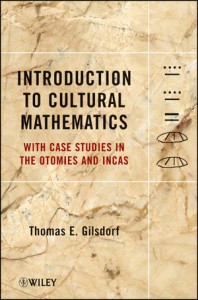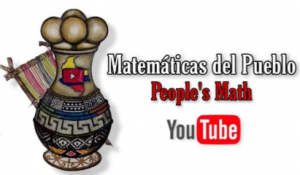Libro: Introduction to Cultural Mathematics: With Case Studies in the Otomies and Incas
 Author: Thomas E. Gilsdorf (thomas.gilsdorf@email.und.edu)
Author: Thomas E. Gilsdorf (thomas.gilsdorf@email.und.edu)
Challenges readers to think creatively about mathematics and ponder its role in their own daily lives
Cultural mathematics, or ethnomathematics as it is also known, studies the relationship between mathematics and culture—with the ultimate goal of contributing to an appreciation of the connection between the two. Introduction to Cultural Mathematics: With Case Studies in the Otomies and Incasintegrates both theoretical and applied aspects of the topic, promotes discussions on the development of mathematical concepts, and provides a comprehensive reference for teaching and learning about multicultural mathematical practices.
This illuminating book provides a nontraditional, evidence-based approach to mathematics that promotes diversity and respect for cultural heritages. Part One covers such major concepts as cultural aspects of mathematics, numeration and number symbols, kinship relations, art and decoration, games, divination, and calendars. Part Two takes those concepts and applies them to fascinating case studies of both the Otomies of Central Mexico and the Incas of South America.
Throughout the book, numerous illustrations, examples, and motivational questions promote an interactive understanding of the topic. Each chapter begins with questions that encourage a cooperative, inquiry-based approach to learning and concludes with a series of exercises that allow readers to test their understanding of the presented material.
Introduction to Cultural Mathematics is an ideal book for courses on cultural mathematics, the history of mathematics, and cultural studies. The book is also a valuable resource and reference for anyone interested in the connections between mathematics, culture, anthropology, and history.
THOMAS E. GILSDORF, PhD, is Professor in the Mathematics Department at the University of North Dakota. He has long been interested in topics such as anthropology and languages, and he has traveled to archaeological sites and cultural centers of numerous pre-Hispanic and indigenous cultures to study mathematics in a cultural context. Dr. Gilsdorf has published and presented research on cultural mathematics, as well as locally convex spaces.


